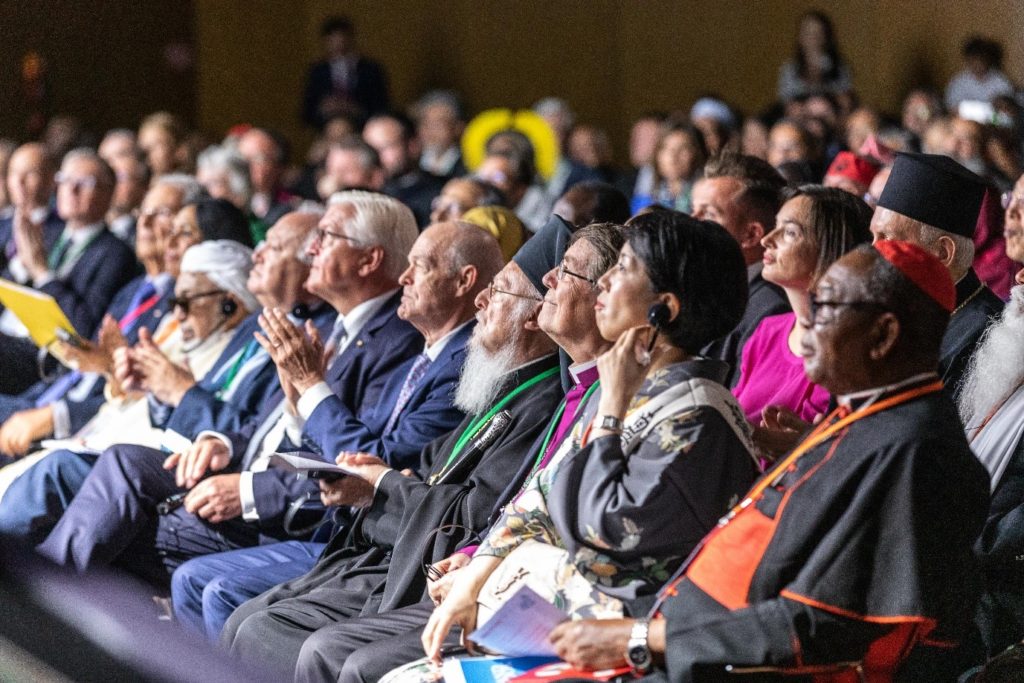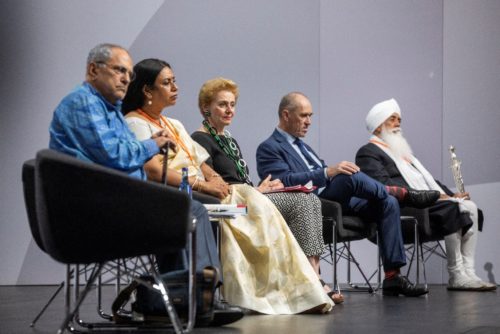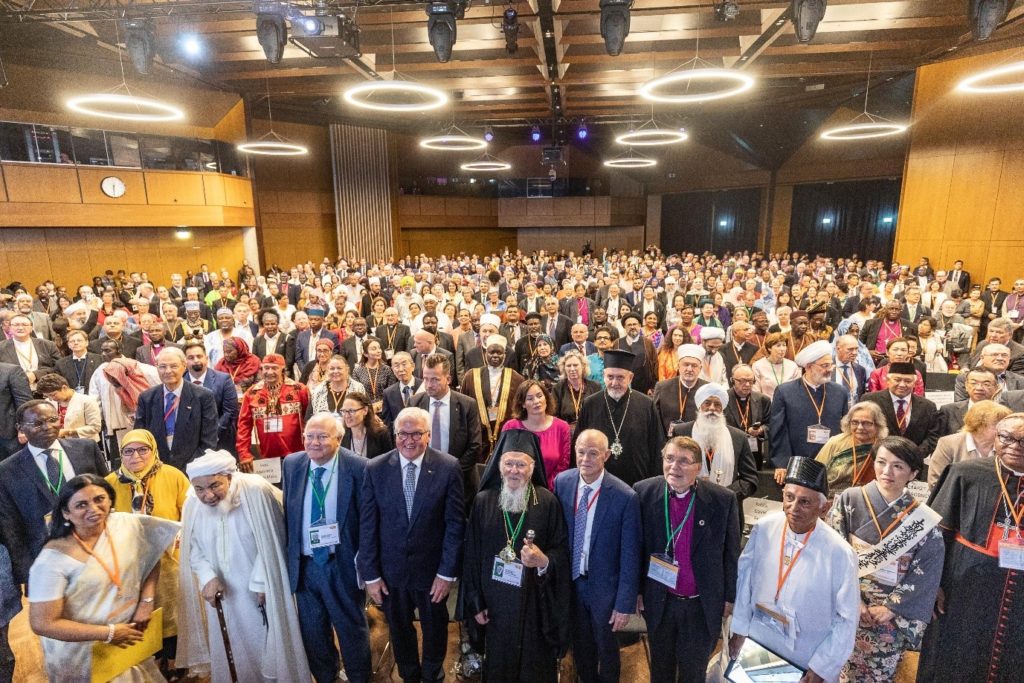Religious Leaders from 125 Countries Gather in Lindau to Promote Common Action for Positive Peace at the Religions for Peace 10th World Assembly
20190820FOR IMMEDIATE RELEASE
(Lindau, Germany) The Religions for Peace 10th World Assembly, in partnership with Ring for Peace and generously supported by the German Federal Foreign Office and Bavarian State Ministry, formally commenced this morning with an opening address offered by German Federal President Frank-Walter Steinmeier and a multi-religious prayer lead by children of faith from across the globe.
In his Opening Address, President Steinmeier said,
Co-Moderators of the Religions for Peace World Council then greeted assembly delegates and participants. RfP Co-Moderators include Rev. Kosho Niwano [President-Designate, Rissho Kosei-Kai], H.E. John Cardinal Onaiyekan [Archbishop of Abuja, Archdiocese of Abuja], Dr. Vinu Aram [Director, Shanti Ashram] and H.E. Shaykh Abdallah Bin Bayyah [President, Forum for Promoting Peace in Muslim Societies].
Rev. Kosho Niwano recalled conversations with her grandfather as a child, where he would acknowledge the immense challenges of the world but ensure her that religious people were working together to overcome these challenges (Rev. Niwano’s late grandfather, Nikkyō Niwano, founded Risshō Kōsei Kai, RfPpartner). She ended by referring to herself as a “granddaughter of Religions for Peace.
H.E. John Cardinal Onaiyekan called upon all to advance Shared Well-Being, a new notion among religious leaders and RfP. He noted that our common humanity rests on our ability to see ourselves in others and challenged all people to change their mindset of true strength and power, stating, “Even today, are we not still measuring the greatness of nations by military prowess, which often translates into economic domination and exploitation of others?”
The audience enjoyed a video collage showcasing RfP’s work creating “open space” for dialogue in Myanmar, empowering women leaders in Liberia and partnering with religious and indigenous communities to protect rainforests thorough the Interfaith Rainforest Initiative.
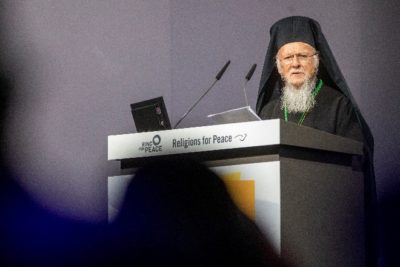 Additional keynote speakers included H.A.H. Ecumenical Patriarch Bartholomew [Archbishop and Ecumenical Patriarch of Constantinople], H.E. Shaykh Abdallah Bin Bayyah [President, Forum for Promoting Peace in Muslim Societies, UAE; Co-Moderator, Religions for Peace] and Dr. William F. Vendley [Secretary General, Religions for Peace].
Additional keynote speakers included H.A.H. Ecumenical Patriarch Bartholomew [Archbishop and Ecumenical Patriarch of Constantinople], H.E. Shaykh Abdallah Bin Bayyah [President, Forum for Promoting Peace in Muslim Societies, UAE; Co-Moderator, Religions for Peace] and Dr. William F. Vendley [Secretary General, Religions for Peace].
H.A.H. Ecumenical Patriarch Bartholomew stated: “We need each other. We cannot face current challenges alone. This is why Religions for Peace is so crucial. Because it presents a unique opportunity to bring all groups together…Existence is coexistence. Being is Shared Well-Being.”
H.E. Shaykh Abdallah Bin Bayyah noted that,
Dr. William F. Vendley began his address noting the burdens of the human family that those in the audience have surely witnessed: the blood of war, the crushing weight of poverty, the global migration crisis. However, he called upon Assembly delegates and all people of good will to advance what RfP has termed Shared Well-Being. To clarify this call, he stated,
“At root, we are relational… As radically relational, our well-being is intrinsically “shared.”
[In responses to the challenges of our world,] our religions add their foundational concern for the cultivation of virtues. The cultivation of virtue tackles the ignorance, egoism and group egoism that tear the fabric of authentic community.
Societies are good to the degree that they honor and support each member’s efforts to unfold their rights-protected human dignity.”
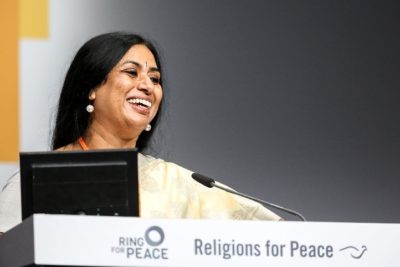
The Ceremony concluded with Dr. Vinu Aram leading a Pledge of Commitment According to One’s Own Faith. All delegates stood in up to recite their commitment to multi religious action and respect for all religious differences.
In the afternoon, Assembly delegates participated in the first plenary, entitled “Advancing Shared Well-Being as Multi-Religious Vision of Positive Peace.” Religions for Peace has been advancing the concept of Shared Well-Being since its 8th World Assembly in Kyoto in 2006 but has more recently concretized the concept to be a multi-religious vision of positive Peace. The concept acknowledges that human beings are relational by nature and asserts that a link exists between unfolding one’s personal human dignity and building up the “common good” through care for, and solidarity with all persons, living beings and future generations.
The cumulation of this multi-religious notion of Shared Well-Being has resulted in Dr. William F. Vendley’s [Secretary General, RfP] Commission Paper for the Religions for Peace 10th World Assembly, entitled: “Advancing Shared Well-Being as a Multi-Religious Vision of Positive Peace,” which is the paper that guides this Plenary Session.
The Plenary was moderated by Dr. Vinu Aram and Revd. Dr. Thomas Wipf [President, European Interreligious Council of Religious Leaders (ECRL–Religions for Peace)] offered the opening address.
Panelists will include H.E. Jose Ramos Horta [Former President and Prime Minister of East Timor, Nobel Peace Prize Laureate] and Mr. Steve Killelea [Founder and Executive Chairman, The Charitable Foundation; Institute for Economics and Peace; Treasurer and International Trustee, RfP] and Dr. Georgette Bennett [President and Founder, Tanenbaum Center for Interreligious Understanding].
The Plenary will conclude by voting on the first of four Action Points. These are a new procedure that will take place in the Assembly Plenary Sessions of the RfP 10th World Assembly. Prior to the Assembly, Religions for Peace shared these Action Points with all voting delegates to prepare them for an up or down vote during each Plenary. The goal of the Action Points is to move Assembly delegates directly towards the ultimate goal of common action.
The first Action Point on the Charter for Forgiveness and Reconciliation (Peace Charter), presented by Bhai Sahib Bhai Mohinder Singh, OBE KSG [Chairman, Guru Nanak Sewak Jatha; Co-President, Religions for Peace]. The Action Point was joyously adopted by the delegates. The Peace Charter recognizes the urgent and profound need for reconciliation in communities experiencing conflict, as experience shows that conflicts resume in the absence of reconciliation. Urgent efforts to end the physical violence do not address the important process of reconciliation, which compromises peace settlements and thwarts true positive Peace. RfP has repeatedly experienced the absence of reconciliation among people and communities struggling to come out of situations of destructive violence and oppression. RfP knows well that religions have profound and unique resources that can—if mobilized and creatively adapted—contribute to reconciliation.
